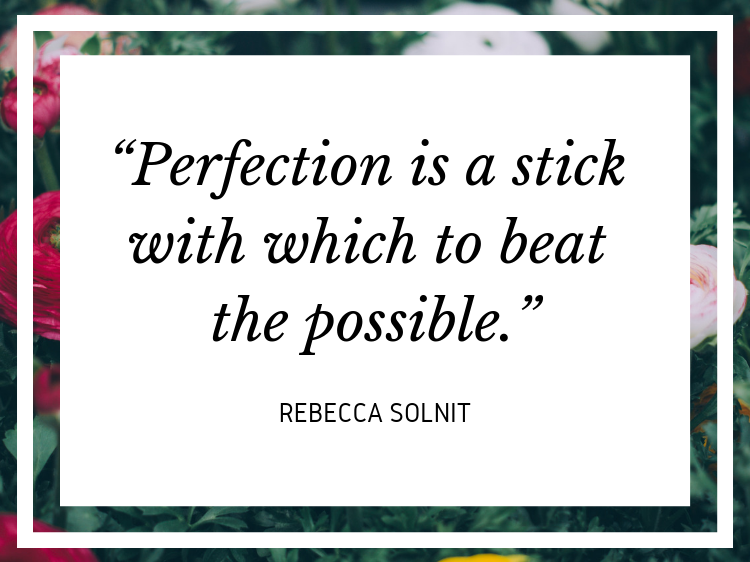Unconventional Mentor no. 28 Rebecca Solnit
“Perfection is a stick with which to beat the possible.”
Quote: “Perfection is a stick with which to beat the possible.” - Rebecca Solnit
If you have ever experienced the phenomenon that is mansplaining, then you will love the collection of essays by Rebecca Solnit called Men Explain Things To Me, which includes the essay that inspired the term. In the essay, Solnit recounts the time a man interrupted her talking about her new book on Edward Muybridge, to tell her all about a new book about Edward Muybridge which was, you guessed it, the very same one written by her. It took her friend saying three times, “she wrote it” for this man to be quiet and realise the error of his way. I’ve never been mansplained to in quite this way, but I have lost count of the number of times when a man has confidently launched into a monologue at me about something that I am more qualified than him to talk about and not be able to get a word in edgeways.
Men Explain Things to me was the first book by Rebecca Solnit that I read, and I instantly fell in love with her style of writing. I love reading fiction, and being transported into another world, but there is a different sort of pleasure that comes from reading a non-fiction essay. It’s the pleasure of seeing the thoughts that you have expressed so eloquently by someone else, the discovery of new ideas and a connection with someone who you have never met.
In her 2015 essay The Mother of All Questions Solnit reflects on the question that I’m sure all women have been asked, the question enquiring about whether or not they have or are going to have children. The essay starts with Solnit recalling her experience on a panel talking about Virginia Woolf (A future Unconventional Mentor who I am more than a little bit obsessed with) and she was asked whether or not Woolf should have had children. It infuriated her so much that eventually she just responded with “fuck this shit”. She had been asked to talk about Woolf’s writing so why were they discussing children? The whole essay is a thoughtful reflection on what motherhood means in our society and the way that women, regardless of whether or not they have children, have that aspect of their lives publicly dissected in a way that men don’t.
“Society’s recipes for fulfilment seem to cause a great deal of unhappiness, both in those who are stigamtized for being unable or unwilling to carry them out and in those who obey but don’t find happiness.”
I had felt that a lot of Solnit’s work resonated with me before I read this essay, but reading it made me feel even more of a connection with her. A woman who hasn’t married and had children through choice and is, gasp, happy, is a rare thing indeed and to find such a brilliant role model was wonderful. The essay is a really wonderful piece, concluding that the desire to ask people these rude and intrusive questions centres around our beliefs about what happiness is. If we think marriage and children are the secret to happiness, then we are curious as to why someone wouldn’t want to be happy. It is very thought provoking and well worth a read.
Solnit’s writing covers so many different topics and it seems odd to have to put her into any one category. A lot of her writing is feminist, and she writes extensively about human rights, the environment and everything to do with the human condition. The last book of hers that I read was A Field Guide to Getting Lost and I absolutely loved it. From the back of the book “In this investigation into loss, losing and being lost, Rebecca Solnit explores the challenges of living with uncertainty.”
I’m so pleased that I have found the work of Rebecca Solnit, her writing really speaks to me but at the same time it leaves me feeling very inarticulate about the important topics of life. Not in a bad way, it makes me want to learn and read more.
Mentor advice: Focus on getting things done rather than focussing on getting things perfect.
The advice that I take from Rebecca Solnit is to focus on getting things done rather than focussing on getting things perfect. I know that I can be guilty of delaying starting do a project or not starting all together because I can’t see how I am going to be successful at doing it. I set these high expectations for what something has to be and then feel that I can’t measure up to it. I am beating the possible with my perfection stick. What I have come to learn is that it is ok for me to just get started and allow myself the time to develop my work into something good.
I was talking to someone I coach this week about this same thing. We had both been in situations when something was new to us and felt crap because we weren’t getting everything right first time and were receiving feedback on what we were needing to do to improve. I have learnt that in these situations I need to give myself a break, and to realise that getting things wrong is the way that you learn how to do them right. If I can embrace errors, failures and having to write multiple drafts to get something right then I am giving myself the opportunity to learn and to explore the possible.
To find out more about Rebecca Solnit and her writing visit her website here
